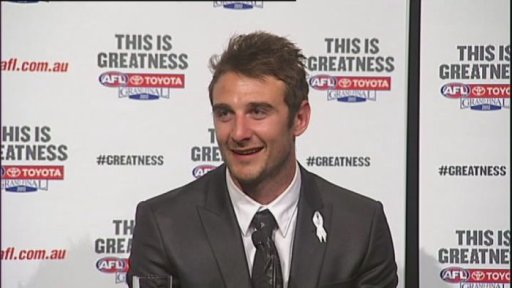 Jobe Watson is a worthy winner of the Brownlow medal.
Jobe Watson is a worthy winner of the Brownlow medal.
He plays hard but fair. He is courageous and he leads by example. And in the dog days of Essendon’s season, when his teammates looked liked they had given up the ghost, Jobe just kept on keeping on.
So I congratulate Jobe Watson and salute his achievement.
And also say in all honesty that I hope he is the last winner of the medal.
Modern football has moved beyond the Brownlow medal as we know it.
The concept of the best and fairest player is indeed noble and I’d like to see it continue.
I’d also like to see all teams playing fast attacking footy too, but that isn’t going to happen when Ross Lyon can develop a gameplan that gets blokes like Brett Peake and Robert Eddy into Grand Finals.
How do we define “fairest”? Is it fairest over the season in that a player who has been suspended at any point can’t win it?
Or should it be collation of the votes from games where players were judged by the umpires to be among the three best and fairest players on the day/night/twilight?
Take one game from this year: Round 16, North versus Carlton.
The game is important in the Brownlow context for two incidents. First, Chris Judd’s infamous chicken wing tackle. Judd’s actions were about as close to the definition of unfair as you can get – deliberating hurting a prone and trapped defenceless player.
But Judd also played a blinder that night and got two votes. And quite rightly so. No free was paid at the time of the incident and although the North players on the scene knew something was definitely up, you can forgive the umpires for not knowing exactly what had happened in the confusion of yet another stoppage, ball up and play on.
It took a video review from the Match Review Panel to clearly identify Judd’s wrongdoing and the punishment to be dealt out.
The other incident involved the Jack Ziebell bump on Andrew Carazzo. Again, at the time the umpire didn’t pay a free, in fact said umpire said at the time that Ziebell was going for the ball, play on.
This is not to re-hash the rights and wrongs of either incident. But it does prove that the umpires, filling in their Brownlow voting forms post game, would have been quite legitimately unawares that both players had committed offences worthy of long suspensions.
This is where the game has moved beyond the system. In ye olde times – when the rules of the Brownlow were devised – the umpires either reported a bloke there and then or they didn’t. And if they had reported a bloke, it is unlikely verging on impossible that they would hand out votes to the individual in question.
The trend is towards more and more incidents being cited post game. In fact, that is the entire intent of the MRP. The on-field report is rapidly becoming a thing of the past. So if we don’t find out who has committed unfair acts on-field until two days afterwords, why are the umpires being asked to vote straight after the game?
It makes absolutely no sense whatsoever. There is an argument that the umpires could make their votes after the MRP has reported, but the one key element of the Brownlow that still makes sense is the giving of the votes straight after the game. That way, umpires can’t be affected by media reports, or even worse.
As I said, Jobe Watson is a worthy winner of the award. A great footballer suitably recognised for a magnificent season.
But the Brownlow is now becoming debased and it is the AFL itself leading the charge. The very basis upon which it exists is being undermined.
The AFL are keen to reform, often with eye-raising creativity, aspects of the game once thought inviolate.
Perhaps Adrian Anderson and crew could turn their pointy heads to the Brownlow?



